A drop of water in an ocean of distress
Wednesday May 31
It is 9 PM. I am going home from the south of Yogya, both ways there had been monster traffic jams, but mission accomplished : we have delivered the goods bought this morning to the villagers of Bebekan who were very happy. Of course it is only a drop in the ocean. The village of Bebekan hasn't yet received any food aid or logistical help. The army came this morning to start clearing the rubble, but there is still quite a lot to do. The local villagers went to the main road to beg for money and were able to collect 150,000 rps which allowed them to buy a bit of petrol for their stove and lamps.
Electricity isn't back yet and won't be for days. They only have 2 or 3 tents (for 500 people). At night everything is pitch black and thieves try to sneak into the ruins to steal what is left, which forces the villagers to set up a night guard. There are many mosquitoes since it has rained heavily every night since the earthquake.
The situation I am describing isn't specific to Bebekan. The majority of villages still haven't received any aid. The obvious priorities in the first days were medical : treating the wounded and excavating the bodies of those who died. The army started to clear the ruins and to demolish houses which threatened to collapse. But one thing is clear : food and logistic aid are stagnating in warehouses and are not being distributed, or barely so. Hundreds of villages are in the same situation as Bebekan. So why have I chosen to help this particular village ? Because fate brought me to it. Here is how.
Discovering Bebekan
Sunday morning,
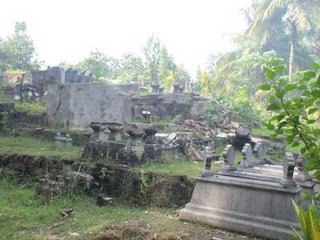 May 29. I drive to a district of Bantul where one of my friend lives (she and her son are now staying with me). As much as 95% of her district was destroyed and 18 people dies. This Sunday morning, we are attending the burial of a woman. On the way to the cemetery, little girls throw flower petals in front of the coffin carried by men. In the procession, a woman comes to me and says : "It is my cousin who is being buried. If you have time after the burial, I would like to bring you to a village which I have discovered yesterday (Saturday night). The people are very poor but they are wonderful. Their village has also been totally destroyed. I have known this village through my old mother. She lives in a village located at the foot of Bebekan village, built on a little hill. She went there on Saturday morning dragged along by a crowd driven by panic, a thousand villagers running away from the threat of a tsunami. They sought refuge in Bebekan because of its higher elevation. That morning, after having buried their two casualties, the villagers of Bebekan had decided to nonetheless celebrate, as planned, the marriage of two young couples in the middle of the ruins. The meal, which had been prepared the night before, had not been destroyed by the earthquake. No sooner did the ceremony start that they saw the mad crowd of a thousand people invading their village. They shared the modest banquet with them. Later the crowd went to the cemetery of the village, situated at the highest point. There they spent the night after having built improvised bamboo shelters. My mother was with them, and this is where I went to look for her."
May 29. I drive to a district of Bantul where one of my friend lives (she and her son are now staying with me). As much as 95% of her district was destroyed and 18 people dies. This Sunday morning, we are attending the burial of a woman. On the way to the cemetery, little girls throw flower petals in front of the coffin carried by men. In the procession, a woman comes to me and says : "It is my cousin who is being buried. If you have time after the burial, I would like to bring you to a village which I have discovered yesterday (Saturday night). The people are very poor but they are wonderful. Their village has also been totally destroyed. I have known this village through my old mother. She lives in a village located at the foot of Bebekan village, built on a little hill. She went there on Saturday morning dragged along by a crowd driven by panic, a thousand villagers running away from the threat of a tsunami. They sought refuge in Bebekan because of its higher elevation. That morning, after having buried their two casualties, the villagers of Bebekan had decided to nonetheless celebrate, as planned, the marriage of two young couples in the middle of the ruins. The meal, which had been prepared the night before, had not been destroyed by the earthquake. No sooner did the ceremony start that they saw the mad crowd of a thousand people invading their village. They shared the modest banquet with them. Later the crowd went to the cemetery of the village, situated at the highest point. There they spent the night after having built improvised bamboo shelters. My mother was with them, and this is where I went to look for her."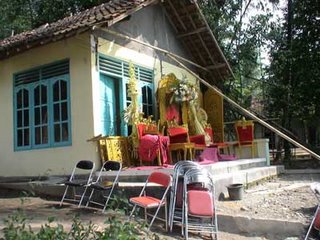
I have written about this village in the Paris-Match article. It has a population of 500 inhabitants, and 42 of their 44 houses have been destroyed. They are peasants without land. They are agricultural workers who cultivate the land of others, raise the animals of other people and also build the houses of other people. They are poor but hardworking, and they seemed a very tightly knit community, in harmony with their natural surroundings in spite of the devastation. I came there for the first time on that Sunday morning with the woman who had approached me, Emi. We had brought nothing for them, no help of any kind, but they promptly gave us coconuts which they fetch by climbing the trees. I found them very enterprising and positive in spite of the catastrophe. There are undoubtedly many other villages with such qualities, but this is the one that I was brought to. I believe that to sponsor one village is more efficient and human than distributing massive amounts of assistance.
Wednesday May 31. Cooperating with SAR Yogya
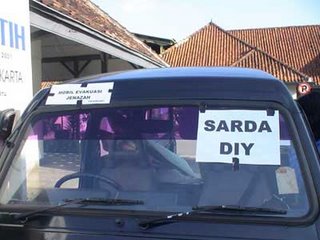 Since government help was not reaching the people, thousands of citizens of Yogya have, of their own initiative, gone themselves to buy the necessary products with their own money in the stores of the story and delivered these themselves with their own car. This is what I did, already on the first night of the earthquake for the district of my friend. And this morning for Bebekan. With the 100 euros sent by my mother, I was able to buy 30 boxes of milk powder, 20 sarongs, 200 packets of instant noodles, 5 liters of oil, 20 boxes of hygienic towels, 10 antiseptic soap bars, alcohol, disinfectants, bandages, cotton, etc.
Since government help was not reaching the people, thousands of citizens of Yogya have, of their own initiative, gone themselves to buy the necessary products with their own money in the stores of the story and delivered these themselves with their own car. This is what I did, already on the first night of the earthquake for the district of my friend. And this morning for Bebekan. With the 100 euros sent by my mother, I was able to buy 30 boxes of milk powder, 20 sarongs, 200 packets of instant noodles, 5 liters of oil, 20 boxes of hygienic towels, 10 antiseptic soap bars, alcohol, disinfectants, bandages, cotton, etc.They absolutely need more tents. But since we can't find them in Yogya anymore, a female friend of mine who coordinates the help of volunteers is going to buy them in another town. A 5m x 7m tent costs 100,000 rps, equal to 9 euros. I have ordered 5 tents. They also need petrol lamps and lamp oil, flashlights and batteries, plastic mats, and basic foods : sugar, oil, rice, eggs, milk for children, medicine against colds and diarrhea, mosquito repellent. There is no doubt that when international help arrives, the villages will be inundated (or not) with such products. But for now, they have nothing. And it is the first days which are the most important to sustain their morale and their health. If they fall into despair and become sick, the reconstruction of their lives and of their houses will be very difficult.
I am ready to do the buying and to go by car every two days to Bebekan to bring the requisite aid. From Yogya, it takes about 2 hours to reach the village because the roads are full of vehicles and often jammed on many kilometers. If some people want to contribute to this concrete and direct aid, I will write an expense report every two days and give some news about Bebekan. Today three young Indonesian volunteers from SAR (Search and Rescue) escorted me for the journey, one inside the car and the other two on a motorcycle, to protect me from any aggression by people standing on the side of the road and begging for help. They have pasted on my car their SAR label and the words : "Car commissioned to evacuate a dead body". If unexpectedly governmental or international help should start raining on Bebekan, we could transfer the remaining funds on another forgotten village or invest it in a small long-term project in Bebekan.
Project for the coming days
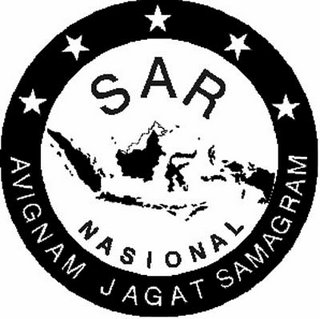 A short explanation about SAR. It is an organization made up of young Indonesian volunteers, mostly students, dedicated to the evacuation of wounded or dead people. After the Aceh tsunami, they went twice to help evacuate the dead bodies. For the Yogya earthquake, they went from village to village to evacuate the wounded and the dead. They thought their mission would end there. Their headquarters is in the office building of the Governor of Yogyakarta on Jalan Malioboro. It is a rented office but they are not linked to any governmental structure. The families of the wounded people they had evacuated came to see them to ask for food and logistical help because they said they were not getting anything from the authorities. So in spite of themselves they became involved in collecting and centralizing data about which villages had gotten help and which ones had not, since the government isn't centralizing any data on this matter. Everything is dispersed, the NGOs don't know where they should distribute their aid and many villages, until today Wednesday May 31, still haven't receive anything : no tents, no lamps no food.
A short explanation about SAR. It is an organization made up of young Indonesian volunteers, mostly students, dedicated to the evacuation of wounded or dead people. After the Aceh tsunami, they went twice to help evacuate the dead bodies. For the Yogya earthquake, they went from village to village to evacuate the wounded and the dead. They thought their mission would end there. Their headquarters is in the office building of the Governor of Yogyakarta on Jalan Malioboro. It is a rented office but they are not linked to any governmental structure. The families of the wounded people they had evacuated came to see them to ask for food and logistical help because they said they were not getting anything from the authorities. So in spite of themselves they became involved in collecting and centralizing data about which villages had gotten help and which ones had not, since the government isn't centralizing any data on this matter. Everything is dispersed, the NGOs don't know where they should distribute their aid and many villages, until today Wednesday May 31, still haven't receive anything : no tents, no lamps no food. SAR is therefore compiling a detailed map of the disaster area with the collaboration of cartographers and geologists of Gadjah Mada University and have started to inform the NGOs on the specific situation of the villages by cross-referencing all the data given to them by the organizations about the progress and specifics of their activities. In principle this should be the duty of the government but it is not fulfilling it. SAR is doing all this without any money, in a totally voluntary way. They offer volunteers and cars to bring aid to the forgotten villages. Tomorrow, or after tomorrow at the latest, they will have completed the map which they will make available on an Internet website and will constantly update. (When the address of the website is known, I will put it here.)
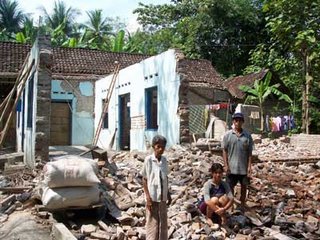 This morning, after a very practical discussion with Mazurki and Asep, the two backbones of SAR, we have decided to do the following with the funds you have provided us : we will keep focused on the village of Bebekan. The people of Bebekan have told us yesterday that the five neighboring villages had not received any help. We will go back there tomorrow morning with four SAR volunteer students : the car will be full of mats, rice, storm lamps, petrol, milk, clothes, aspirin, vitamins, 5 tents, oil, etc. All these things were bought thanks to your donations.
This morning, after a very practical discussion with Mazurki and Asep, the two backbones of SAR, we have decided to do the following with the funds you have provided us : we will keep focused on the village of Bebekan. The people of Bebekan have told us yesterday that the five neighboring villages had not received any help. We will go back there tomorrow morning with four SAR volunteer students : the car will be full of mats, rice, storm lamps, petrol, milk, clothes, aspirin, vitamins, 5 tents, oil, etc. All these things were bought thanks to your donations. In Bebekan, we will build a bamboo structure to serve as an aid center, called "posko" : communication post, and the four students will stay there in order to coordinate aid, ensure its distribution to Bebekan and the neighboring villages, which we will visit tomorrow. This light and inexpensive structure, posko, is essential in the coming days to receive international aid or aid coming from local organizations or groups, such as Jarum, Kompas, etc. If there is no Posko, the NGOs don't know to whom they should distribute the aid. Furthermore, this aid must have a follow-up : how many bags of rice are left today, what does this village need...
One must understand that this is not a situation where the victims are parked in big refugee camps. They are refugees in their own village, which means a great amount of dispersion, which means that the work to be done covers a very large surface. And even if they are not dying of hunger, or are not suffering the horrors of war for example, they are still living amid the ruins of their own houses, without electricity, without a roof, or in tents for those who have one, without any sanitary facilities, without the possibility to buy anything in their local area, because all the small stores have also been destroyed, without work, without money. This situation will likely last for many weeks, probably months, even if many of the villagers are hardy and dynamic. One the priorities is to clear the rubble of the houses with the help of big machines so that the locals can already start reconstructing as best they can while waiting for funds earmarked for reconstruction. The Indonesian government has organized poskos in some areas and villages but none in many other. The role of the SAR volunteers will therefore be to inform their HQ in Yogya of the stock level, to make sure that aid is fairly distributed to all the villagers and to act as a reception center for various NGOs. Since international help is starting to arrive, it would somehow be absurd, as are still doing thousands of people in Yogya such as me, to go buy food and other necessities at the local supermarket for the villagers, when huge stocks of these things are already piling up in the warehouses and waiting to be channeled to the needy villages.
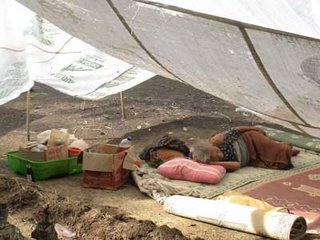 What I am writing now will certainly be modified tomorrow when we go to Bebekan. One must know how to improvise on a daily basis because the situation is constantly changing, and the needs also. But the idea of a posko which we will sponsor with your donations and in collaboration with the logistical know-how of SAR seems like a good one and can eventually lead to long-term projects to help the villagers rebuild their houses according to earthquake-proof standards.
What I am writing now will certainly be modified tomorrow when we go to Bebekan. One must know how to improvise on a daily basis because the situation is constantly changing, and the needs also. But the idea of a posko which we will sponsor with your donations and in collaboration with the logistical know-how of SAR seems like a good one and can eventually lead to long-term projects to help the villagers rebuild their houses according to earthquake-proof standards.Elisabeth
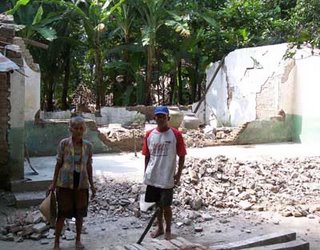

0 Comments:
Post a Comment
<< Home